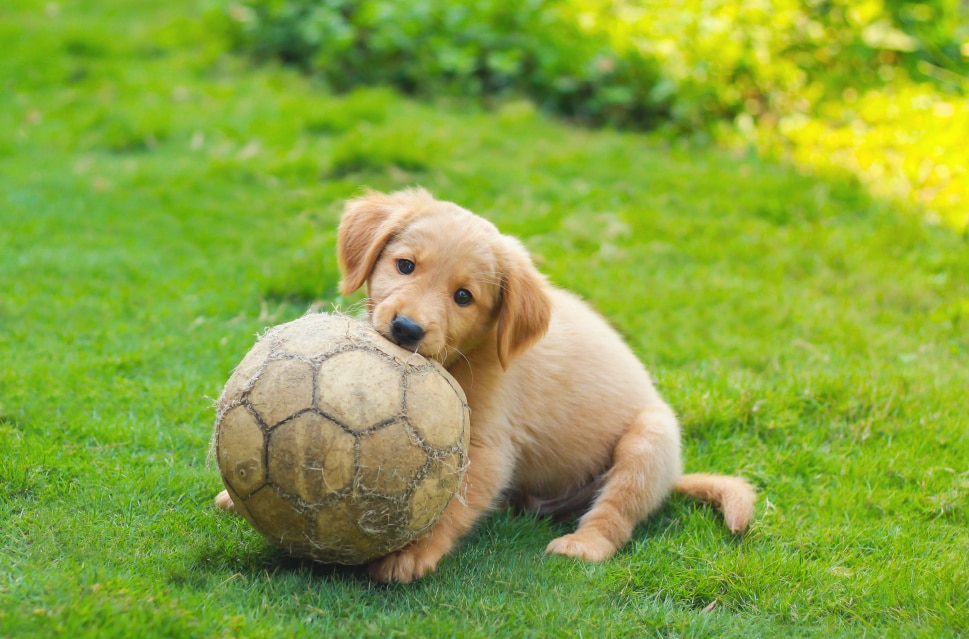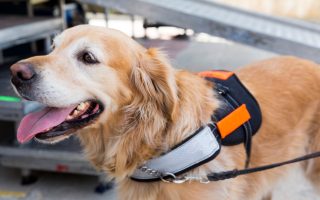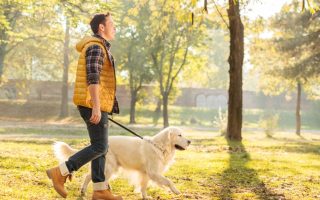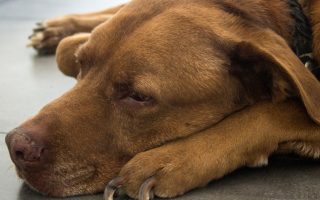Are you the owner of a lab puppies? In that case, you will probably notice your pooch nibbling on pretty much everything around the house. At this stage in the puppy’s life, it can be challenging, but it is crucial to accept that puppies eventually outgrow their puppyhood.
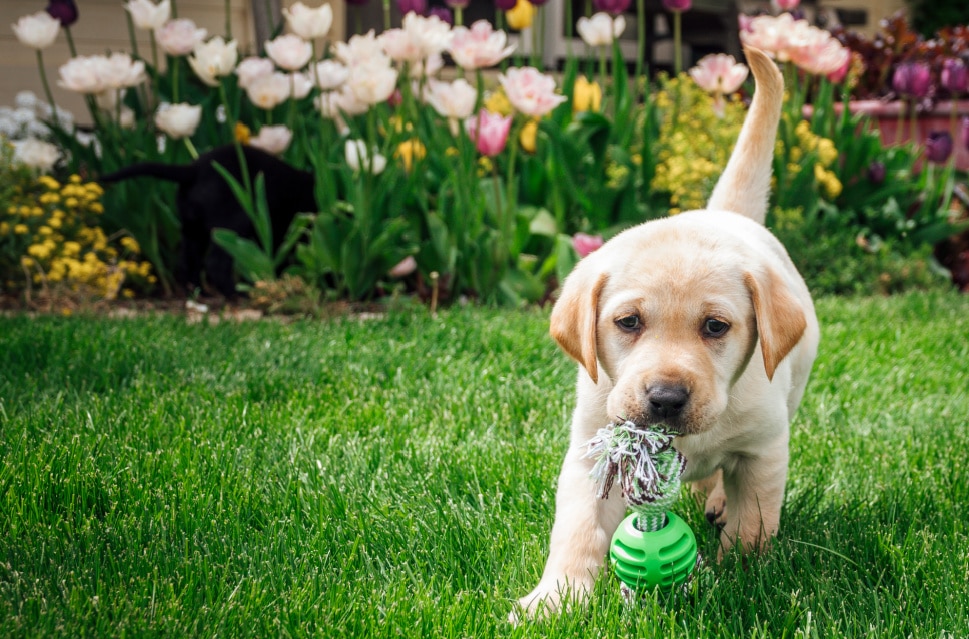
I know there are a lot of things that you are concerned about. Like your puppy’s nutritional needs, comfort, and no doubt the fun part – do they get the attention they deserve, or do you know when do lab puppies lose their teeth.
Lab puppies love to play and snuggle with their human companions, and their one annoying characteristic is their teeth and biting behaviors.
The fact is, they enjoy manipulating your belongings as if they were alligators and sharks, constantly gnawing on you and your goods.
Usually, puppies do not mean to cause damages by biting, they’re actually teething.
Remember: Taking care of a lab puppy is a full-time responsibility comparable to raising a human child. Although the time spent on a puppy is worthwhile.
Seeing your lab puppies grow is an incredible experience that is hard to put into words. Yet, there are also some concerns involved.
Once you have a puppy, lots of learning needs to be done, in order to be aware and knowledgeable. Find answers to all of your questions in this detailed guide.
Puppy Teething – What Does It Mean?
“Puppy Teething” is a common term among puppies parents. A time when puppies lose their baby teeth and the adult ones start to emerge.
The process is part of your pup’s natural physiology, an essential part of their development, and indicates their maturation.
With any luck, teething will go smoothly for your pup with minimal hiccups during that time.
The majority of dogs, however, get in a great deal of discomfort when they are teething, which is when chewing comes in handy.
It is common for puppies to develop sore gums during the teething process, as their adult teeth begin to poke through the gums.
To alleviate teething discomfort, chewing helps soothe the teeth. As your pooch grows, it is normal for them to nibble and chew.
Please note: Canines also chew in order to inspect everything that’s new to them. The fact, that they can’t grab things with their hands – so they use their mouth to grab them.
Here is a guide to lab puppy teething, including information on when or what you can expect from the teething process with just a few symptoms as their adult teeth develop.
Teeth Loss-Growth Cycle During Puppyhood
Just like all other creatures, puppies are born without teeth. Puppies teeth begin to appear around the time of weaning, which usually occurs between 5-6 weeks of age, but depending on the breed, they can appear as late as 8 weeks of age.
Beginning with their first tooth, a puppy gets 28 teeth, temporary teeth, referred to in different ways like milk teeth, deciduous teeth, or just simply puppy teeth.
There’s no need to worry, they’re probably teething, and the chewing thing, umm it’s a little bit painful, yeah but that’s how nature works, one way of soothing the pain while the pup gets its “Adult Teeth”.
When Does A Lab Puppy Lose His First Teeth
A lab puppy drops his/her 1st milk or deciduous teeth during 13-17 weeks of age. Puppy teething in this phase actually falls under the “ 2nd teething stage”. At this stage, your puppy loses his baby teeth and replaces them with permanent ones.
After 3 months, puppies begin to lose their baby teeth. At around 4 months, it is likely your puppy will have some missing teeth.
These teeth are remarkably sharp, designed to help them successfully adapt to carnivorous life after tasting meat for the first time.
A few of the theories regarding sharpened teeth are associated with introducing solid food and assisting the pups in controlling their biting instincts.
Lab Puppy Teeth Loss: What Causes It
A puppy’s teeth fall out when he or she reabsorbs the roots of the milk teeth, causing them to fall out.
Once the root is fully reabsorbed the tooth becomes loose and is easily knocked out when the lab Puppies eats or chews his toys.
Teething Gels For Puppies
Fairly speaking, there are those who favor teething gels made for puppies. Although applying something to a puppy’s gums does not seem to have much effect, doing something to help is still a good feeling.
Our recommendation is to speak to your veterinarian if you are considering teething gels. There is disagreement regarding the efficacy or even the danger of teething gels.
A Puppy’s Teething Symptoms
All pet parents experience it at some point and the situation also has another side. Like how do you know if your puppy is teething or not? What if your puppy is going through mental turmoil, chewing everything she encounters.
Chewing
Puppies chew by nature, however, if he suddenly shows a significant increase in her chewing behavior, it may indicate that he is teething. Make sure to give him his own toy because otherwise, you will regret it.
Constant Drooling
Puppies that are teething experience intense gum pain which leads them to constant drooling. When chewing, it gets even worse. During teething, he’s likely to slobber and drool on everything he chews on during that time.
Turn Into A Slow Eater
As soon as the puppy starts to teeth, his mouth starts hurting and it gets even worse as he tries to eat. As a result, his eating rate slows down. Some may even stop eating. If possible, give him something softer and less chewy to eat during this time. Consult with your vet to get a list of soft foods that are suitable for him.
Frequent Whining
Every puppy whines while it is young. However, if you observe unusual whining even after he is past the whining stage, such behavior may be indicative of teething.
Moreover, lab puppies who are teething often whine as they chew on toys as well as when they eat.
Swollen Gums Plus Bleeding
If you find blood on your puppy toy, do not panic. When a puppy’s gums swell during teething, the blood rushes out. Unless the toy is drenched in blood and the puppy keeps acting the same, there is no need for further concern.
There’s nothing to worry about since your pup is losing the baby teeth in order to grow the adult ones.
Remember – It is possible for swelling and discomfort to persist for some time, so do not be shocked if the symptoms persist.
However, if the bleeding seems excessive compared to normal teething, consult your veterinarian right away.
Look Out For The Lost Teeth
Most puppies lose their teeth while playing, so keep an eye out for teeth in his toys after he chews them.
Owners of lab puppies often save their teeth to preserve their memory. If you wish to do the same, simply wash it, dry it well, and keep it in a safe place. This would be a great contribution to a memoir about your pet.
Ideal Teething Toys for Lab Puppies
As the lab puppies starts to teethe, the majority of pet parents are devastated to see their beloved puppies tearing up their house, devouring shoes, TV remotes, couch cushions, or digging through the garbage.
The puppy’s ability to get away with anything in exchange for rewards has the potential to become a habit as it seeks out the reward over and over.
So why don’t give them something more ideal to chew on. We have listed some of the best toys that you can gift your pooches to cheer them up.
- Nylabone Key Ring Toy
- Kong Puppy Binkie Toy
- NWK Freezeable Chew Toy
- Kong Puppy Goodie Bone
- Tuffy’s Gear Ring Toy
Canine Frozen Food
If for some reason there is a circumstance that prevents you from getting a toy, you always have the option of soaking your lab puppy’s dried food in warm water for at least 5 minutes prior to freezing it. Now freeze it.
Frozen food is great because it can be given to your pup and they can chew on it for quite a while, plus there is no concern for toxicity or choking. You won’t have to worry about a mess, your pup will sweep up anything left behind.
A Puppy-Proof Home
The purpose of puppy-proofing your house is to ensure you don’t become resentful towards your puppy.
It’s important to remember that he is still a puppy with a sore mouth. He will appreciate any relief he gets from his perspective.
Your house should be puppy-proofed just as much to keep your stuff secure as it is to ensure the safety of your pooch.
Therefore, ensure cables are hidden when not in use. You should also ensure that any cloths or items that hang down cannot be reached by your puppy in order to prevent them from falling down and hurting him.
A baby gate gives you complete control over where your puppy is allowed to go around the house.
Do my puppies stop teething at a certain age?
About 7 months of age is the average age at which puppies stop teething, and the majority of them will have their permanent teeth by the age of eight months.
There is a common belief that chewing will cease after this phase, which may not always be true. Besides teething, there may be various causes of the giddy chewing common to labradors.
Other Dental Concerns
Teething alone will not upset the stomach of your puppy or make him sick. A puppy’s teeth can cause problems, however.
There are two main reasons for this. One is how the jaw is structured. Secondly, there is the issue of teeth positioning during growth in the jaw.
Retained Teeth Problem
Occasionally, a puppy’s baby teeth don’t fall out as expected. Check your puppy’s mouth with your veterinarian to see if there are still any erupting teeth.
Baby teeth that remain in your puppy’s mouth can hinder his development of adult teeth, which in turn can result in problems later on for your puppy.
Take Good Care Of Teeth
Establishing a routine for dog dental care during puppy teething is beneficial. If you begin brushing your dog’s teeth early, it will be easier to keep them brushing for a long time.
Additionally, you will gain an understanding of your dog’s mouth and teeth, which will prove invaluable when brushing the tough to reach spots.
Don’t hesitate to call your vet if something appears out of the ordinary. You will notice that your puppy has grown adult teeth soon.
FAQs
Question 1: At what age do puppies begin teething?
Answer: Puppies lose their milk teeth between 12 and 16 weeks of age. The incisors are the ones that are the first to drop out. After four to six months of age, pups start dropping their puppy teeth – which are small, razor-sharp teeth with long tips. Puppies lose their molars in their late development, between 5-7 months of age. Depending on the breed, puppies will lose their baby teeth at a certain age.
Question 2: Is teething painful for puppies?
Answer: Puppies who are teething tend to have a lot of pain in their gum and mouth. Just because of this, they usually drool more often than they did in their earlier days. Even if your puppy is a breed that drools excessively, you will likely notice an increase in drooling while your puppy’s teething.
Question 3: What is the best way to stop a puppy from chewing destructively?
Answer: If your pup is biting an inappropriate item, provide him with his favorite chew toy, and if he persists, give him a loud “No” and a pointed finger. Nevertheless, you should lavish them with praise as soon as they accept the toy. Encourage your puppy to become obsessed with toys. You can even use the toys to give them food.

